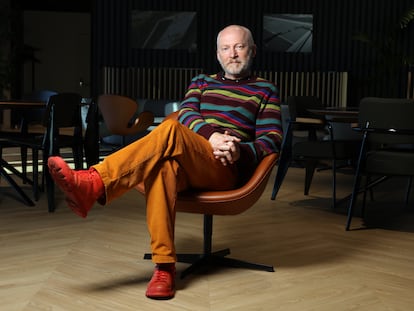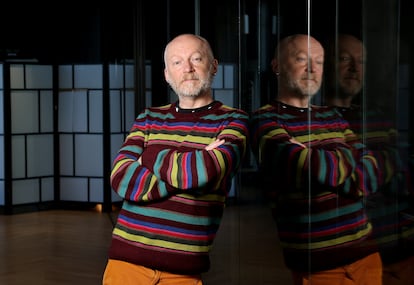Mathematician Marcus du Sautoy: ‘There is a possibility that artificial intelligence will become conscious’
The Oxford University professor posits the emergence of ‘a new species’ stemming from algorithms


It’s unusual for a mathematics lecture to include laughter, but Marcus du Sautoy, 58, makes it happen. The London-born mathematician, musician, Arsenal fan and Simonyi Professor for the Public Understanding of Science at Oxford University deploys all the tools at his disposal to bring people closer to science. In his presentations, he often uses a whole repertoire of games, music, theater and magic tricks to invite audiences into the “exciting world of mathematics.” He demonstrated this approach on November 21 at a conference organized in Madrid by the Spanish Royal Mathematical Society and IE University, where he talked to young people who will be “the scientists of the future,” which he is particularly passionate about.
The latest of his 10 published books discusses the secrets of some of the best games in history — such as Rock, Paper, Scissors, tic tac toe and Monopoly — and their relationship with numbers. In Around the World in 80 Games, he explains how these pastimes provided the first opportunities for a deep understanding of the world and how mathematics and games are an integral part of human psychology and culture. Du Sautoy considers himself “a techno-optimist,” but warns of the dangers of artificial intelligence.
Question: Are games a good way to bring people closer to mathematics?
Answer. Yeah. Everyone loves games. So do I, but for me games are defined by rules. This is a very good way of looking at the logical implications of rules, and mathematicians are very good at analysing how to play games well. So, if somebody enjoys playing games and they understand the underlying mathematics, they’re going to play this game better. That’s a good way to explain to them why learning how to think about the world mathematically is important…Games are a very powerful way to explain what mathematics is good for. It’s not about long division or percentages but about understanding a structure and how to navigate that structure in the most efficient way.
Q. What is your favorite game?
A. I like ancient games. Backgammon is my favorite; it has everything I’m looking for in a good game. Our game shouldn’t finish before it starts…You really have to match your players very carefully at the same level. It’s never Garry Kasparov against Donald Trump in chess; that’s not an interesting game. Garry Kasparov against Donald Trump in [the ancient Indian board game] snakes and ladders might be interesting. Actually, a good game is one that combines a bit of chance with a bit of strategy…Backgammon has that sweet combination of chance and strategy.
Q. What do you think of the ability of machines to easily beat humans at games?
A. Games are very conducive places to test artificial intelligence, primarily because games have a unique quality: they are self-contained, pleasant worlds. The crucial aspect of a game is that it is separate; it’s its own space and, at the same time, it’s an excellent place to allow artificial intelligence to unfold safely and showcase its capabilities… artificial intelligence has taught us a superior way to play the game. So, that’s exciting. Yes, it has opened a new way of playing the game, but, on the other hand, is it a threat now that a human can defeat AI? I don’t think so because humans still enjoy playing the game…Maybe the development of artificial intelligence playing games demonstrates the power of artificial intelligence and humans playing together at a higher level than they could individually, and that’s good for games.
Q. In 2020, before artificial intelligence tools became popular, you told EL PAÍS that it was important to keep an eye on the evolution of this technology. What is your opinion today?
A. We’re in a truly important phase of change due to the impact of artificial intelligence. In fact, I believe people have been quite amazed at how good it is. Even industry professionals have been quite surprised at how powerful it is. But it comes with dangers, and I think that’s the important point I talked about a few years ago and still find very important today; you really need to understand how this works to use it effectively, because you still have to understand that it works statistically, in the sense that it understands what the most probable words are to follow the paragraphs it has already seen. And that won’t always give you things that are necessarily true, so you have to be very skeptical of what sounds incredibly convincing because it has learned to be persuasive.

Q. In the past, you expressed a mostly positive view of AI. Has your position changed?
A. I am a techno-optimist overall but even though I am, I think we need to ensure that decisions are not solely in the hands of technological developers right now. The power is primarily in the hands of those in the industry developing these tools, and that’s why we have to integrate society into decision-making, and that’s why the government must be involved. We have legal cases looming, and we can’t let only the creators of the tools decide how they will be regulated. I’m still very optimistic from a technical point of view, and I think the dystopian narrative that we will be annihilated as a society is a bit fanciful. I don’t think that’s where the real threat lies. I think it’s a threat to democracy, and I think those are the areas we need to be careful about. We are very malleable, easily influenced by things, and these tools are very good at leading us astray. So, I think that’s where I see the threat, not as an existential threat to our species.
Q. Do you see AI as a new species?
A. I think it’s a really interesting and relevant image for the future because I think at some point, we will have to let AI evolve. I think we need to see it more as a tool… The best comparison would be with a telescope because I think the development of the telescope allowed Galileo to see things in our solar system that we had never seen before. For me, this is like a telescope into the digital world. We have a massive amount of digital data that our species finds very difficult to navigate, and this allows us to see patterns and things in them… But having said that, as we move forward, there is a possibility that this could become conscious. At that point, I think we might have to talk about a new species.
Q. What happens if AI becomes conscious?
A. We would have to consider granting it rights in the same way as animal rights. I think we will have to ask the question of whether we are developing a new species, whether this is an evolution of what we are doing, or whether we are going to have to consider a new hybrid species, which is probably the perspective of integrating artificial intelligence into our own species. Elon Musk is considering the idea with Neuralink. His response to the existential threat of artificial intelligence is that no, we must become it, we must integrate artificial intelligence and humans, which will generate new philosophical, social, and legal dilemmas in the future.
Q. Is that likely to happen soon?
A. I think that’s far away. I think consciousness is very far away. Consciousness in a computer will probably be very, very different from our consciousness, and that will be one of the interesting problems: if we will even be able to tell when we know. It has already convinced someone at Google that its large language model had become conscious and that person was willing to sacrifice their job for it. This model clearly is not conscious, but it knew how to manipulate a human to defend it in the same way that we take care of our cats…There’s a toxicity in the cat’s feces that, in fact, causes a change in our brain structure. The large language model is as if it had infected that human to defend it to the point of losing their job, and it already knew it.
Q. Will mathematics remain a profession in the future?
A. AI is basically algorithms. It’s basically just mathematics. Mathematicians are storytellers so it’s not just about generating. ChatGPT could generate paragraphs, but it’s still can’t write a really good story. I think that we will be using it to sniff out new things that we might not have spotted before, but still a mathematician is going to be the one who understands why something is happening. It’s really important that as we teach our new students of science and mathematics that we integrate courses, not just in the technical side of mathematics, but in the moral and humanistic side of the implications of their science. That is something that is not so typical and needs to be done.
Q. You are a musician, do you find mathematics in this aspect of your life as well?
A. Without a doubt. One thing that happens when you try to talk about the relationship between mathematics and music is that you seem to take emotion out of it…For me, it’s completely the opposite. I think that mathematics has a lot of emotions in it.
Q. Where else in your life do you find mathematics?
A. That’s the subject of the book that I’m writing at the moment called Blueprints. My belief is that mathematics is wherever you see something with structure, and most artworks are about structure, as are music, visuals, architecture. All of the structures are mathematical at heart. My feeling is that there’s very few places that having a mathematical perspective won’t help you in doing whatever you want to do.
Q. What do you think about how mathematicians are portrayed in movies? Do you identify with them?
A. We always go mad at the end of the movies. Now there are more and more positive role models of mathematicians doing amazing things. I quite like the series Numb3rs about a detective whose brother was a mathematician, and it shows how mathematics is useful in crime detection. The lead actor was quite handsome. But there’s a good role model of a mathematician who is showing how his work is important to crime detection. I suppose that’s partly what I try to do in my work: humanize mathematicians and show I’m interested in other things as well. I’m interested in sports. I support Arsenal. I love music. I like theater. I like cinema. We’re not some kind of weird alien species. We are just like every other human but happen to be good at math.
Sign up for our weekly newsletter to get more English-language news coverage from EL PAÍS USA Edition
Tu suscripción se está usando en otro dispositivo
¿Quieres añadir otro usuario a tu suscripción?
Si continúas leyendo en este dispositivo, no se podrá leer en el otro.
FlechaTu suscripción se está usando en otro dispositivo y solo puedes acceder a EL PAÍS desde un dispositivo a la vez.
Si quieres compartir tu cuenta, cambia tu suscripción a la modalidad Premium, así podrás añadir otro usuario. Cada uno accederá con su propia cuenta de email, lo que os permitirá personalizar vuestra experiencia en EL PAÍS.
¿Tienes una suscripción de empresa? Accede aquí para contratar más cuentas.
En el caso de no saber quién está usando tu cuenta, te recomendamos cambiar tu contraseña aquí.
Si decides continuar compartiendo tu cuenta, este mensaje se mostrará en tu dispositivo y en el de la otra persona que está usando tu cuenta de forma indefinida, afectando a tu experiencia de lectura. Puedes consultar aquí los términos y condiciones de la suscripción digital.








































